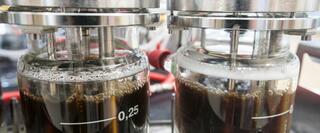Sustainable Biomass Conversion

Great Lakes Bioenergy is focused on increasing the sustainability and efficiency of biomass conversion. These bioreactors, located in UW–Madison's Experimental Fermentation Lab, help researchers explore new ways of improving biomass fermentation.
Generating multiple products from plant biomass
At Great Lakes Bioenergy, we are focused on enabling a new and different biorefinery, one that is both economically viable and environmentally sustainable. Realizing this goal will mean increasing the efficiency and sustainability of biomass conversion and generating a mix of specialty biofuels and bioproducts from as much of a plant’s biomass as possible.
Our research seeks to boost industry economics by finding new ways of processing biomass at low cost, producing a variety of fuels for use in multiple engine types, and converting as much material as possible into bioproducts that are valuable to industry. Research in efficient biomass conversion includes:
- Improving methods for feedstock-agnostic biomass deconstruction and separation by the renewable solvent gamma-valerolactone (GVL) and broad-specificity glycosyl hydrolases (GHs).
- Identifying metabolic burdens and lignocellulosic hydrolysate stresses and how they pose barriers to efficiently producing isobutanol (IBA).
- Designing new platform microbes capable of producing targeted bioproducts from conversion residues created when producing specialty biofuels.
- Devising feedstock-agnostic GVL- and GVL-enzyme methods that provide lignin and sugar for conversion to specialty biofuels and bioproducts.
- Validating engineered biofuel microbes that can efficiently produce IBA or methylbutenol (MBO) in GVL-deconstructed lignocellulosic biomass from diverse bioenergy crops.
- Engineering next-generation platform microbes that produce a range of high-value bioproducts from specialty biofuels conversion residue.